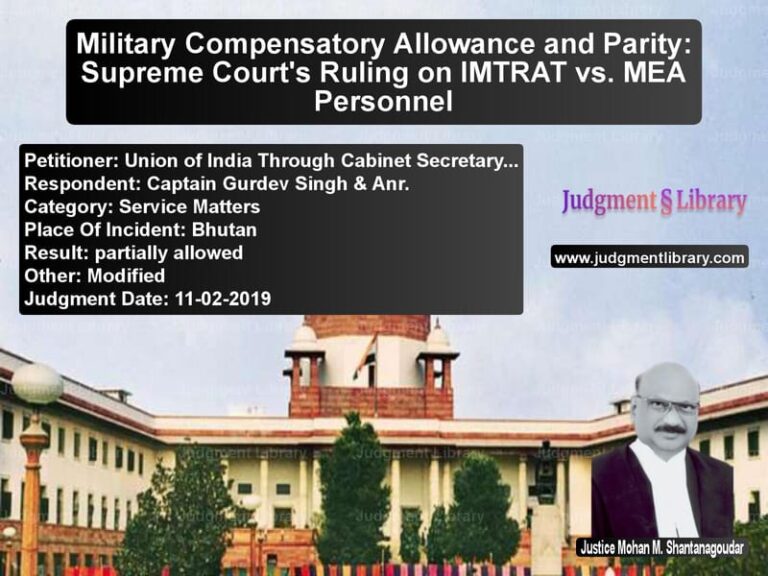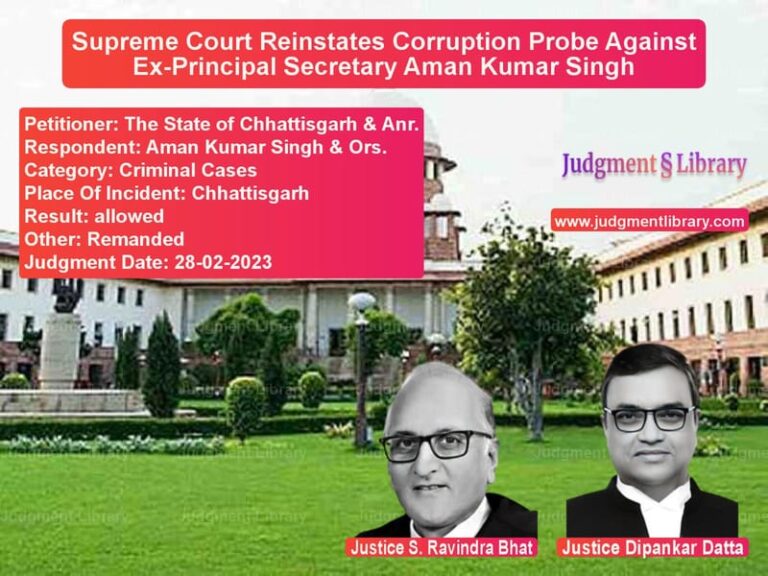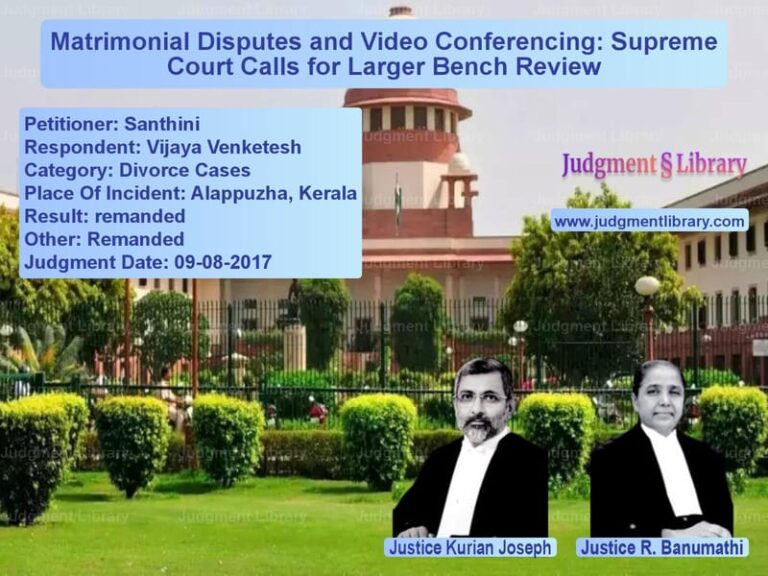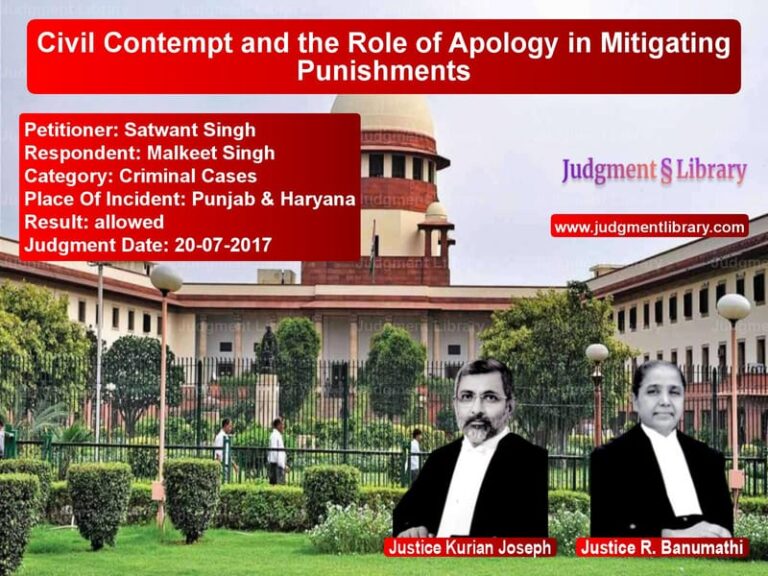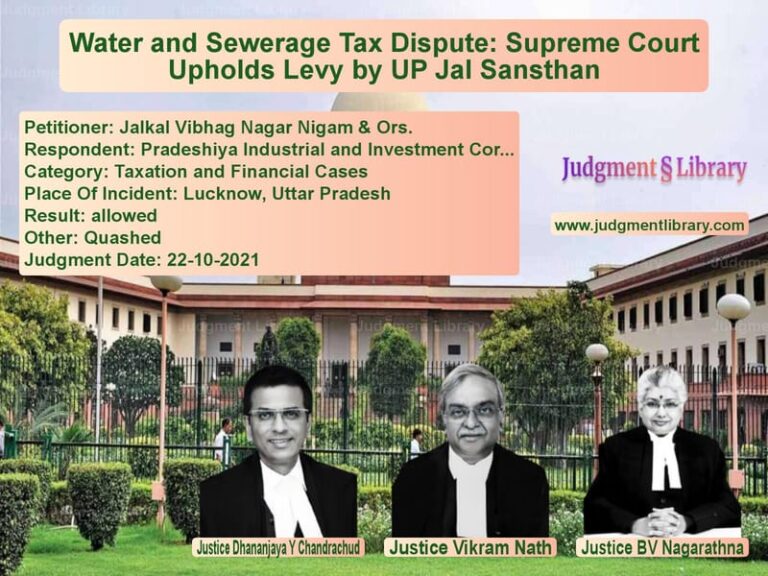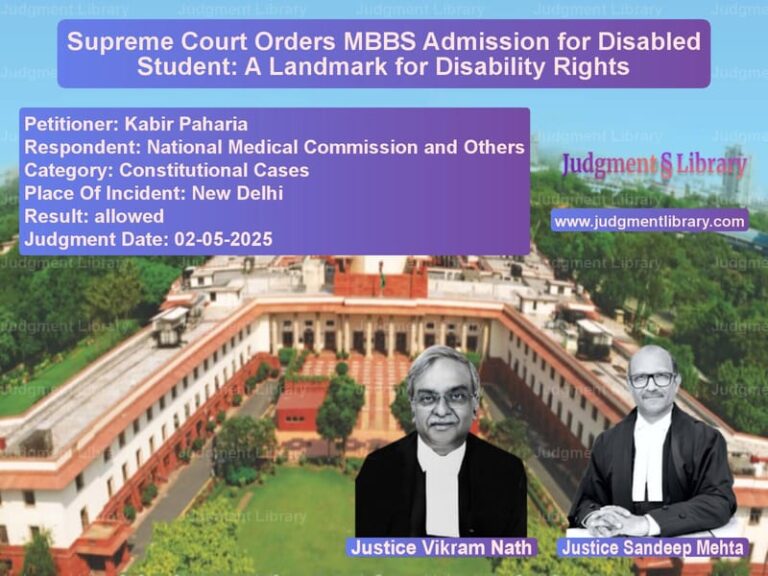Tax Liability in Slump Sale: Supreme Court Rules in Favor of Wave Industries
The Supreme Court of India recently delivered a significant judgment in the case of Wave Industries Pvt. Ltd. vs. State of Uttar Pradesh & Ors., addressing the tax liability of a purchaser in a slump sale agreement. The primary issue before the Court was whether the outstanding tax liabilities of the Amroha Sugar Mill, which accrued before its sale, could be imposed on the purchaser, Wave Industries Pvt. Ltd.
The Supreme Court ruled in favor of the appellant, setting aside the judgment of the High Court and holding that the liabilities relating to the period before the sale agreement should be borne by the seller, the Uttar Pradesh State Sugar Corporation Limited (UPSSCL). This judgment clarifies the principles governing liability in slump sale agreements and the responsibility of tax obligations accrued before ownership transfer.
Background of the Case
The dispute arose from the sale of the Amroha Sugar Mill, one of the four loss-making units owned by the UPSSCL. The UPSSCL, through a public advertisement dated June 29, 2009, invited bids for the slump sale of its unprofitable sugar mills. Wave Industries Pvt. Ltd. successfully bid Rs. 13.94 crores for the Amroha unit.
Subsequently, the parties entered into a Slump Sale Agreement on July 17, 2010, followed by a formal Sale Deed on October 4, 2010. According to these agreements:
- Liabilities accruing before the date of signing were to be borne by the seller.
- Liabilities arising after the signing date were to be borne by the purchaser.
However, the State of Uttar Pradesh imposed tax dues amounting to Rs. 5,68,797 on Wave Industries Pvt. Ltd., even though these dues pertained to transactions before the slump sale agreement. The appellant challenged this liability before the High Court, which ruled against them, prompting the appeal to the Supreme Court.
Arguments by the Appellant (Wave Industries Pvt. Ltd.)
The appellant’s counsel, Mr. T. Srinivasa Murthy, presented the following key arguments:
- The liabilities in question arose before the signing date of the Slump Sale Agreement (July 17, 2010).
- The agreement explicitly stated that such liabilities were to be borne by the seller.
- The purchaser was not operating the sugar mill prior to the signing date and, therefore, could not be held responsible for dues incurred before the takeover.
- The High Court erroneously treated past liabilities as ‘contingent liabilities’ and wrongly imposed them on the purchaser.
- Clause 9 of the Sale Deed and Clause 12.1 and 12.2 of the Slump Sale Agreement clearly stated that tax dues before the signing date were the seller’s responsibility.
Arguments by the Respondents (State of U.P. & UPSSCL)
The respondents, represented by Additional Solicitor General Mr. Balbir Singh and Mr. Pradeep Misra, contended:
- Clause 2.6 of the Slump Sale Agreement transferred ‘all contingent liabilities’ and legal cases to the purchaser.
- The tax liabilities were recoverable only after assessment, which occurred post-sale; thus, they became the purchaser’s responsibility.
- The High Court correctly interpreted the agreement and concluded that the purchaser had agreed to assume liability for all outstanding dues.
- Since the tax dues were not explicitly listed under ‘Excluded Liabilities,’ they should be paid by the purchaser.
Supreme Court’s Judgment
The Supreme Court strongly rejected the High Court’s interpretation, ruling that the tax liabilities arising before the sale agreement could not be transferred to the purchaser. Key observations from the judgment include:
- Clause 9 of the Sale Deed and Clause 12.1 and 12.2 of the Slump Sale Agreement explicitly placed pre-signing tax liabilities on the seller.
- The term ‘contingent liability’ refers to obligations that may arise based on future events. However, the tax dues in question had already accrued before the transfer of ownership.
- “The business liability for the Amroha unit had definitely arisen out of the operation of the unit during the period before the same was sold to the appellant.”
- “The liability in question, not being a contingent liability, cannot be fastened on the shoulders of the appellant.”
- The seller (UPSSCL) had already collected tax from customers on behalf of the State Government, and it was their duty to deposit the collected sum.
- Wave Industries Pvt. Ltd. was neither a dealer nor a manufacturer before the sale and, therefore, had no legal obligation to pay taxes for that period.
Precedents Cited
The Supreme Court cited Bharat Earth Movers vs. Commissioner of Income Tax (2000) 6 SCC 645, where it was held:
“If a business liability has definitely arisen in the accounting year, the deduction should be allowed, although the liability may have to be quantified and discharged at a future date.”
The Court applied this principle to conclude that the tax dues were not contingent liabilities but already accrued liabilities.
Impact of the Judgment
This ruling clarifies the legal position on tax liability in slump sale transactions:
- Purchasers cannot be held liable for taxes on transactions that occurred before they took over a business.
- Slump sale agreements must clearly differentiate between past and future liabilities.
- State authorities cannot impose retrospective tax obligations on new owners.
- Sellers must ensure that all outstanding tax dues are settled before selling a business.
Conclusion
The Supreme Court’s decision in Wave Industries Pvt. Ltd. vs. State of U.P. establishes a crucial precedent for taxation in slump sale transactions. The ruling ensures that purchasers are not unfairly burdened with liabilities incurred by the previous owner. This judgment reinforces the importance of clear contractual terms and safeguards the interests of businesses acquiring assets through slump sales.
The appeal was allowed, and the State of U.P. was directed to bear the tax liabilities in accordance with the agreement. This case serves as a strong reminder for businesses and policymakers to ensure clarity in liability clauses in commercial transactions.
Petitioner Name: Wave Industries Pvt. Ltd..Respondent Name: State of U.P. & Ors..Judgment By: Justice K.M. Joseph, Justice Hrishikesh Roy.Place Of Incident: Uttar Pradesh.Judgment Date: 15-12-2022.
Don’t miss out on the full details! Download the complete judgment in PDF format below and gain valuable insights instantly!
Download Judgment: wave-industries-pvt.-vs-state-of-u.p.-&-ors.-supreme-court-of-india-judgment-dated-15-12-2022.pdf
Directly Download Judgment: Directly download this Judgment
See all petitions in Tax Refund Disputes
See all petitions in Banking Regulations
See all petitions in Judgment by K.M. Joseph
See all petitions in Judgment by Hrishikesh Roy
See all petitions in allowed
See all petitions in supreme court of India judgments December 2022
See all petitions in 2022 judgments
See all posts in Taxation and Financial Cases Category
See all allowed petitions in Taxation and Financial Cases Category
See all Dismissed petitions in Taxation and Financial Cases Category
See all partially allowed petitions in Taxation and Financial Cases Category


